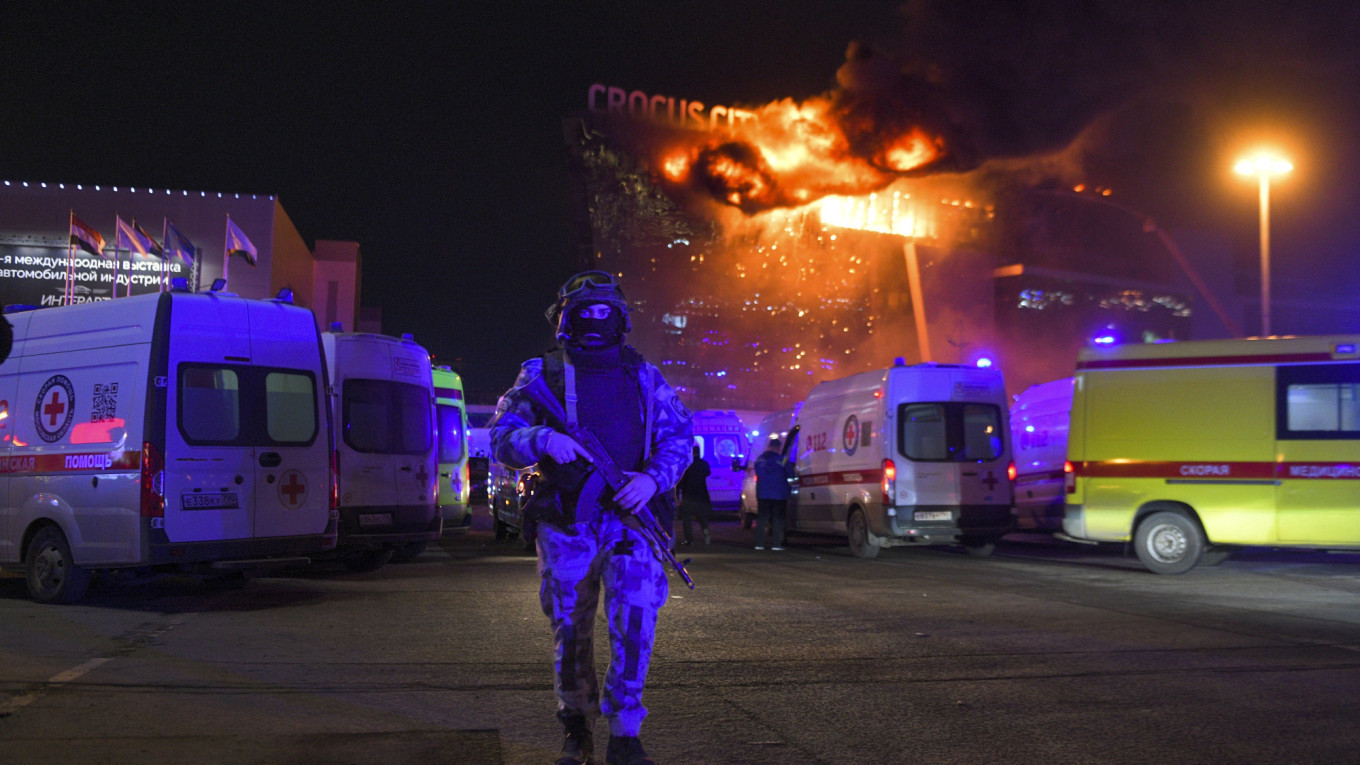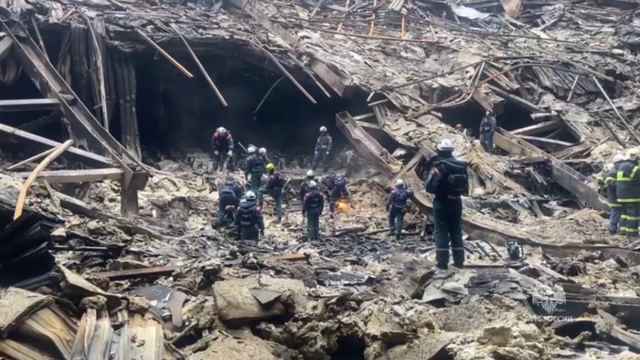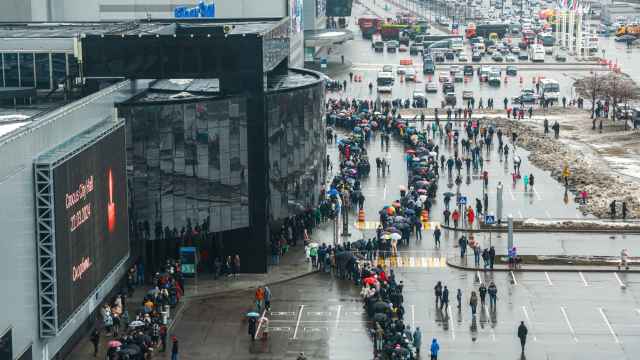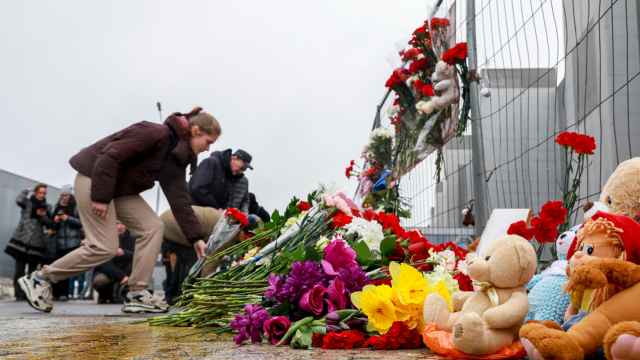Carrying out the worst terror attack in Moscow in 20 years appeared shockingly easy, despite the Russian capital being one of the most surveilled and guarded cities in the world. The metal-detector attendants at the Crocus City Hall stood no chance against men with automatic weapons willing to immediately open fire as they approached the building. The idea police who happened to be present could have confronted the terrorists like in an action movie is the stuff of fantasy.
However, the attack does underline how farcical Moscow’s visible security presence is. The most securitized of any large city in Europe, Moscow is probably more vulnerable to terrorism than ever, as events yesterday clearly showed. If we peel back the curtain of Russia’s security theater, where a superficial appearance of strength does not keep people safe, we can see why.
Since the numerous deadly terrorist attacks during the Chechen wars, Russians have become used to seeing uniformed guards with metal detectors at the entrances to transport hubs, large venues like Crocus City Hall, and even small metro stations. Typically, you have to go through a detector archway and staff will scan your large bag. But putting police and guards everywhere completely desensitizes the public and leads to utter indifference and boredom on the part of security personnel.
If you have guards for everything, that means they are deprofessionalized. Indeed, some of the least capable (including the old and disabled) and least educated people in society become low-paid security personnel. The way they wave a detector wand in a person’s general direction without paying attention reflects a culture in which they will perform their single task without doing anything else they have not been specifically ordered to do.
But that’s not all. A lack of training and motivation, along with low pay and boredom, means that much of the time scanning and searching does not even uncover genuine transgressions.
Anecdotally, behavior that demonstrates this appears with depressing frequency. I’ve witnessed people take firearms on aircraft, and others walk straight past guards into supposedly secure airport zones. I’ve seen people pass sleeping concierges to enter the gated communities of the rich and powerful, and talk their way around security officers guarding sensitive sites merely because they were dressed well or, in the case of women, revealingly. People even cross international borders simply by tossing a few dollars to the right people and waiting until there is an opportunity.
On the flip side, one can be denied entry to your own organized event because you do not have the right piece of paper. Recently, I could not leave a secure building in Moscow because my magnetic token did not register in the turnstile. The guard manning the machine saw me drop the token into the gate, but could not use his initiative to let me through. Time and time again, emergency exits end up blocked or locked on the rationale that people would use them to avoid queues.
Once at an airport, I was asked what I had in my case. “Nothing but a computer,” I replied, and was waved through. Need I go on?
With dozens of guards around just at the entrance to an international airport, everyone assumes that someone else will notice a potential threat. Not to mention the notoriously counterproductive effect of forcing people to line up to pass security gates, which often creates huge concentrations of people vulnerable to attack as they wait to go through security in airports and train stations.
Russia suffers from a lack of public awareness of security, and a culture that it isn’t even the business of ordinary people. I was living in Moscow in 1999 when the apartment bombings happened, and during the 2000s when many attacks occurred on public places in Moscow and St. Petersburg.
As someone who grew up in Britain in a period when the Irish Republican Army carried out repeated terrorist attacks, I have always been struck by how the general public in Russia retreats into oblivion when obvious risks are present. It was as if people were trying to ignore everything they could, minding their own business.
I have asked a busful or carriage of passengers who left a bag unattended many times. Most people had no idea why someone would be concerned about what could be inside. There is also still a culture of entrusting luggage to others on long-distance journeys. I still see people accept luggage from strangers at international airports — the height of naivety.
Then there’s the police. In small towns and other places, local officers may have a good idea about what’s going on and even be effective in detecting crime. But in large cities, the public order threat means patrolling public spaces. This leads to the same problems — boredom, desensitization and focusing on easy targets — the homeless, people illegally hawking goods — and racially profiling taxi drivers to extort them.
The bobby-on-the-beat is not much more than a glorified security guard, except that he’s worse because he can assault people with impunity, and may well have a patron-client relationship with the precinct commander meaning he has to pay up extorted money as tribute.
The misnamed security ministries exemplify more than anywhere else the Russian concept “I’m the boss and that means you’re an idiot.” This saying expresses how a subordinate must never take initiative and always remain vigilantly passive within their hierachy. They must never question orders they were given, nor even ask for clarification. Just as corruption pays upwards, the consequences roll downhill so nobody wants to make matters worse by being a smart-ass.
Leadership is about maintaining distance and impunity. The culture of authority means the person with the most responsibility seeks to avoid any of that duty through delegation in the most unprofessional and unhelpful way. He gets to cover his backside and return to what his job is really about – avoiding boredom and finding ways to make money.
Taking initiative — talking back, bringing a problem to attention, and suggesting a course of action — is socialized out of subordinates at early stages in their career. This works at the level of organizational units too. Just as during the sluggish response to the mutiny led by the now-deceased Wagner leader Yevgeny Prigozhin, one can easily imagine the one security agency local to Crocus City Hall standing idle, assuming that responding was the police’s job, and not deeming it worthy for themselves to coordinate or even communicate effectively.
One should never underestimate the sense of entitlement and superiority among elements of the security services. After all, the state’s largess made them into an untouchable caste. Even in the mainstream media, we find hints of how they are just an illicit business corporation in competition with other agencies.
Russia’s security theatre should be put into its sociological perspective. Agencies and police follow the same logic as that dictated by the broader system — look after yourself and watch your back (especially materially), no one is responsible for others (unless we want to scapegoat them), keep quiet and don’t cooperate with the “others” (don’t cooperate even with sister agencies). Internal collective responsibility is everything.
Thank goodness for the real heroes, ordinary bystanders going to aid those in need, and civic-minded citizens giving blood — an example of the capacity, outside the dysfunctional and incoherent state, that people have to take responsibility and think of themselves as members of society.
A Message from The Moscow Times:
Dear readers,
We are facing unprecedented challenges. Russia's Prosecutor General's Office has designated The Moscow Times as an "undesirable" organization, criminalizing our work and putting our staff at risk of prosecution. This follows our earlier unjust labeling as a "foreign agent."
These actions are direct attempts to silence independent journalism in Russia. The authorities claim our work "discredits the decisions of the Russian leadership." We see things differently: we strive to provide accurate, unbiased reporting on Russia.
We, the journalists of The Moscow Times, refuse to be silenced. But to continue our work, we need your help.
Your support, no matter how small, makes a world of difference. If you can, please support us monthly starting from just $2. It's quick to set up, and every contribution makes a significant impact.
By supporting The Moscow Times, you're defending open, independent journalism in the face of repression. Thank you for standing with us.
Remind me later.








